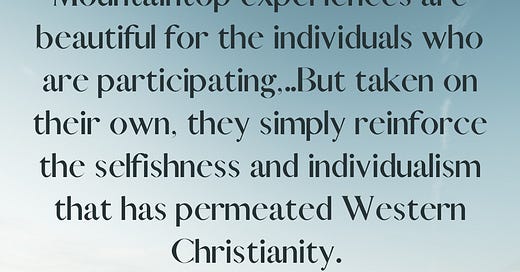Let's Talk about Revival
Peter, John, and James were witnesses to an incredible event, often referred to as “the transfiguration.” They witness Moses and Elijah appear and Jesus’s face and clothes becoming “transformed” and radiating.
If these disciples had any doubts about Jesus being the Son of God, in that moment, at least for however long the transfiguration lasted, surely those doubts were eradicated. These doubts may have come back later, because well, that’s how life often works. It is often a cycle of faith and doubt.
And don’t get me wrong, unique mountaintop experiences like that in which Peter, John, and James experienced are fantastic. But often time this story of the transfiguration is divorced from the larger message of the gospel. This understanding of the transfiguration often contributes to a view of mountaintop experiences or revival, that is heavily individualized. The focus becomes on capturing and maintaining that “high” for the individual and these “revivals” often becomes a way of escaping from the world.
The larger message of the gospel, that one can’t be separated from this passage is that Jesus preached a God that elevated and centered the marginalized and he preached a kingdom that stood in stark contrast to the Empire of Rome. For Jesus, the Kingdom of God brought total and full liberation-physical, spiritual, and yes political. The transfiguration isn’t some separate message or random story, but it is a recognition that Jesus’ mission was true and endorsed by God.
In a similar way, when we talk about mountaintop experiences or revival you can’t separate those experiences from Jesus' larger mission. And western Christianity in its various forms often focuses on mountaintop experiences that make the individual feel good but whose larger impact is at best negligible or at worst oppressive.
I mean, how many Evangelical “revivals” have led to the empowerment of forms of Christianity that have focused on oppressing queer people, taking away reproductive rights, and ignoring the poor and the marginalized?
Experiencing days of singing praise music and being able to openly express one’s personal love for God is beautiful and I don’t want to take that away. But in such an individualized country, the focus isn’t on how to take the mountaintop experience and empower us to advocate for the kingdom of God on earth-a kingdom where hierarchy, oppression, and violence are abolished, instead, it becomes about the individual feeling good.
There’s nothing wrong with feeling good, but the gospel isn’t concerned with making sure that individuals “feel good all the time.” In fact, implementing the gospel often means letting go of our desire to “get ahead,” at the expense of others, it means letting go of the obsession with being rich and wealthy, and powerful.
Especially for those of us who hold some sort of privileged position in society-whether due to our race, gender identity, education, economic status, job, etc the gospel often doesn’t “feel good.” When revival is reduced to feel-good experiences, the gospel becomes of secondary importance.
But if we viewed “revivals” in the context of the gospel, we would recognize that these experiences aren’t to be highs to be constantly chased after, but they are to empower us for the difficult moments to come: they are to serve as a reminder of Jesus’ purpose and mission, especially in light of pushback from systems of empire. These experiences are to empower us to live out the gospel: to feed and clothe the hungry, to liberate the imprisoned, and to advocate for a more just and equitable world.
Mountaintop experiences are beautiful for the individuals who are participating, but if we can hold those experiences in light of the gospel, they have the potential to create lasting and liberating change. But taken on their own, they simply reinforce the selfishness and individualism that has permeated Western Christianity.
Image: A man standing on top of a mountain. Text: Mountaintop experiences are beautiful for the individuals who are participating,..But taken on their own, they simply reinforce the selfishness and individualism that has permeated Western Christianity.



